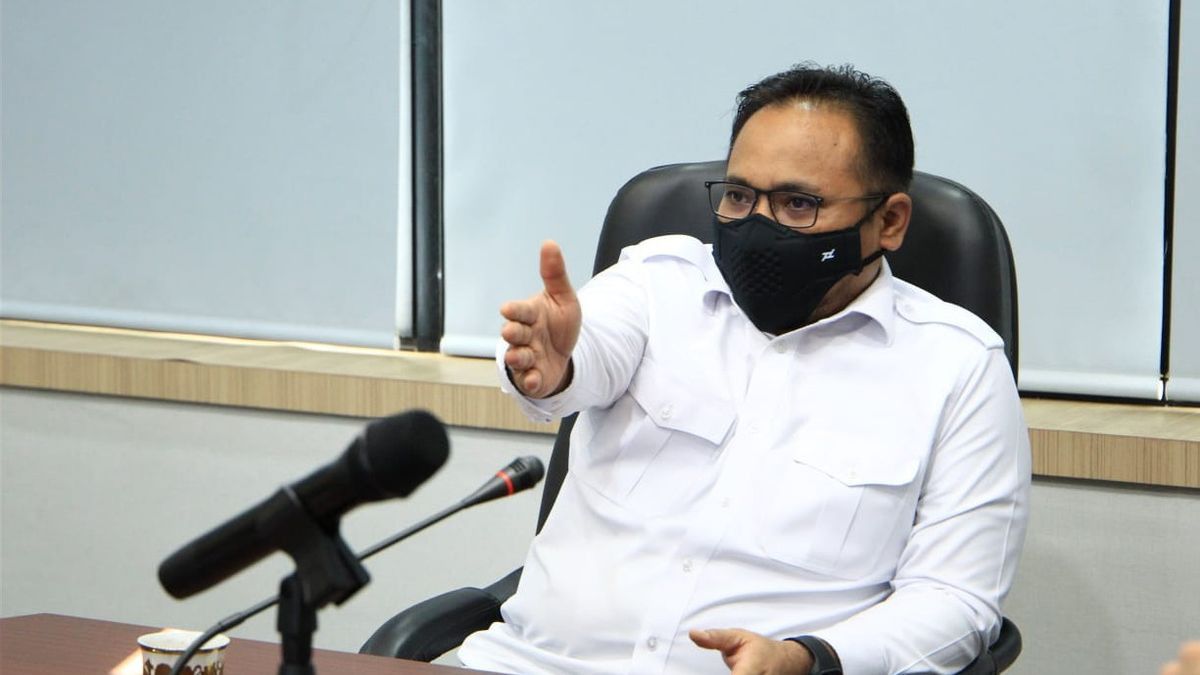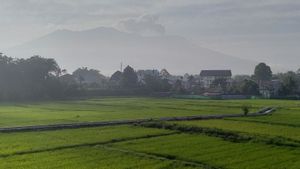JAKARTA - The Ministry of Religion has issued rules for implementing health protocols in the implementation of Eid Prayers 1442 H/2021 M. As well as, the implementation of qurban during the COVID-19 pandemic. This is stated in the Circular of the Minister of Religion, SE. 15 Year 2021.
"To provide a sense of security to Muslims in the midst of the uncontrolled COVID-19 pandemic and the emergence of new variants, it is necessary to implement strict health protocols in the implementation of Eid prayers and the implementation of the 1442 H qurban," said Minister of Religion, Yaqut Cholil Qoumas in Jakarta, Wednesday, June 23.
According to the Minister of Religion, this circular is intended as a guide in efforts to prevent, control, and break the chain of the spread of COVID-19 in all risk zones for the spread of COVID-19. "This is implemented in order to protect the community," he explained.
This circular is addressed to the ranks of the Directorate General of Islamic Guidance, the Head of the Provincial Office of the Ministry of Religion, the Head of the Regency/City Ministry of Religion, the Head of the District KUA, the leaders of Islamic Organizations, the administrators of mosques and prayer rooms, the committee for celebrating Islamic holidays, and Muslim communities throughout Indonesia.
"Officials from the Ministry of Religion at the central level monitor the implementation of this Circular in a hierarchical manner through the vertical agencies under them," said the Minister of Religion.
The following are the provisions of the SE circular. 15 of 2021 concerning the Implementation of Health Protocols in the Implementation of Eid Prayers and the Implementation of Qurban in the Year 1442 H/2021 AD:
1. Takbiran night to welcome Eid al-Adha in principle can be carried out in all mosques/musalas, with the following conditions:
as follows:
a. It is carried out in a limited manner, at most 10 percent of the capacity of the mosque/musala, by observing strict COVID-19 health protocol standards, such as using masks, washing hands, maintaining distance, and avoiding crowds.
b. Mobile Takbir activities are prohibited to anticipate crowds or crowds.
c. Takbiran activities can be broadcast virtually from the mosque/musala according to the availability of telecommunications equipment in the mosque/musala.
2. Eid prayers on 10 Zulhijjah 1442 H/2021 AD in open fields or in mosques/musalas in the Red and Orange Zone areas
3. Eid prayer 10 Zulhijah 1442 H/2021 AD can be held in an open field or in a mosque/musala only in areas that are declared safe from COVID-19 or outside the red and orange zones, based on the determination of the regional government and the COVID-19 Task Force -19 local.
4. In the event that the Eid prayer is held in an open field or in a mosque, as referred to in number 3, it is obligatory to apply the COVID-19 health protocol standards strictly, with the following conditions:
a. Eid prayer is carried out in accordance with the pillars of prayer and the delivery of the Eid sermon in a short, maximum 15 minutes.
b. Congregations for Eid prayers attended at most 50 percent of the capacity of the place to make it possible to maintain distance between rows and between congregations.
c. The Eid prayer committee is required to use a body temperature checker in order to ensure the healthy condition of the congregation in attendance.
d. Elderly people or people who are not in good health, have just recovered from illness or from travel, are prohibited from attending Eid Prayers in open fields or mosques/musalas.
e. All congregants must continue to wear masks and keep their distance during the Eid al-Adha prayer until it is finished.
f. Each congregation brings their own prayer equipment, such as prayer mats, mukena, and others.
g. The preacher is required to wear a mask and a face shield when delivering the Eid prayer sermon.
h. After the Eid prayer, the congregation returned to their respective homes in an orderly manner and avoided shaking hands by physically touching.
5. The implementation of qurban in order to pay attention to the provisions as follows:
following:
a. The slaughter of qurban animals takes place within three days, on the 11th, 12th, and 13th of Zulhijjah to avoid crowds of people at the location of the qurban.
b. The sacrificial animals were slaughtered at the Ruminata Slaughterhouse (RPH-R). In terms of the limited number and capacity of the RPH-R, the slaughter of sacrificial animals can be carried out outside the RPH-R with strict health protocols.
c. The activities of slaughtering, skinning, chopping meat, and distributing sacrificial meat to members of the public who are entitled to receive it, must observe strict application of health protocols, such as the use of tools not interchangeably.
d. The sacrificial animal slaughtering activity may only be carried out by the qurban animal slaughter committee and witnessed by the person who is offering the sacrifice.
e. The distribution of qurban meat is carried out directly by the committee to residents in their respective places of residence by minimizing physical contact with each other.
6. The Islamic Holiday Committee/Iduladha Prayer Committee before holding the Eid prayer in an open field or mosque/musala must coordinate with the local government, the COVID-19 Task Force and local security elements to find out information on zoning status and prepare supervisors so that the COVID-19 health protocol standards are carried out properly, safely and under control.
7. In the event of an extreme development of COVID-19, such as a significant increase in the positive number of COVID-19, a mutation of a new variant of COVID-19 in an area, the implementation of this Circular Letter is adjusted to local conditions.
The English, Chinese, Japanese, Arabic, and French versions are automatically generated by the AI. So there may still be inaccuracies in translating, please always see Indonesian as our main language. (system supported by DigitalSiber.id)













